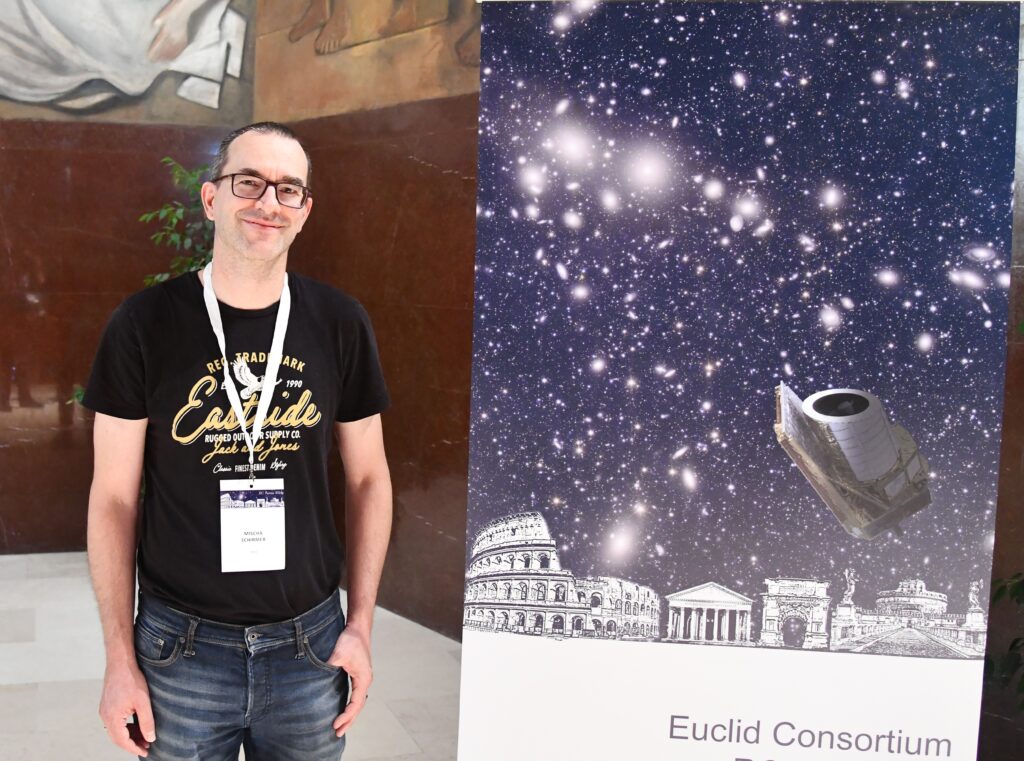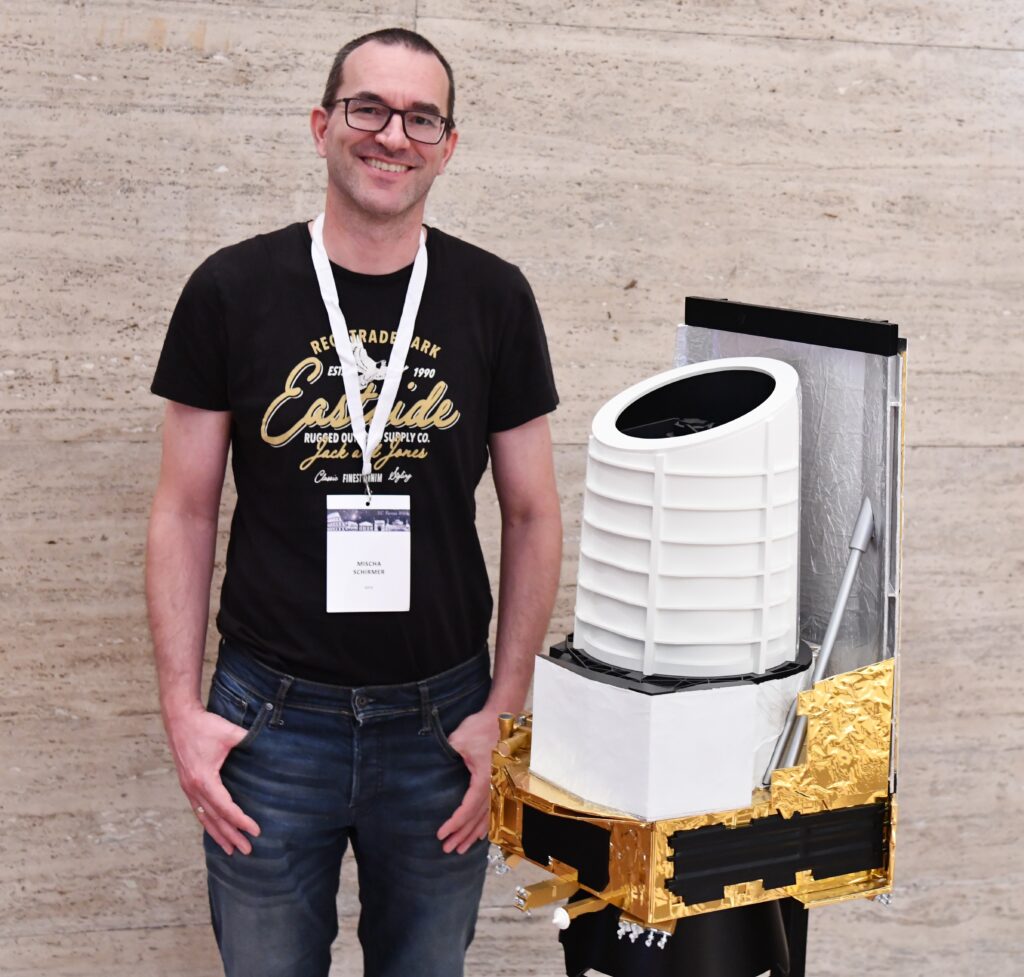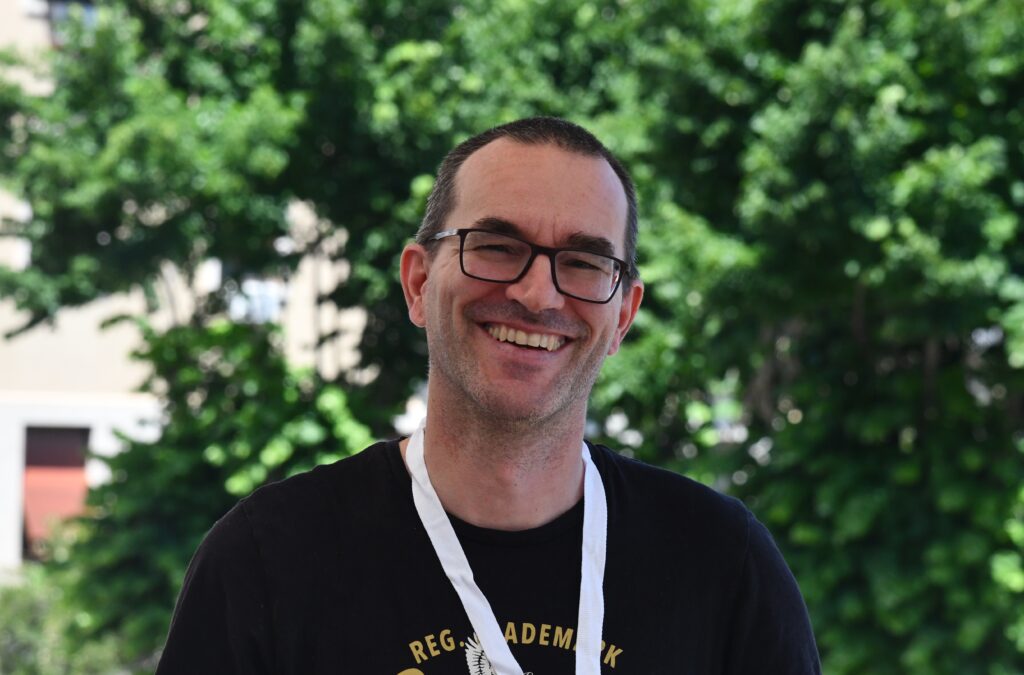Euclid is a space mission planned, built, and operated by more than 2000 scientists and engineers across Europe and other countries. In Portraits of Euclideans we showcase the people behind the mission.
In this portrait: Mischa Schirmer, Euclid calibration scientist

- Can you tell us something about your background?
I was born in 1973 and grew up 50 km north of Munich, in a – back then – somewhat laid-back and cozy part of Bavaria. Whenever I get to go back there and hear people’s dialect, I feel my roots despite it’s 25 years since I moved away. It’s a very special place, and I’ll probably never lose my accent. At the Max-Planck Institute for Astrophysics in Garching, I found that I could much communicate better in English with some co-worker from the North and East of Germany than in the different dialects of our common native language.
- Do you remember how you got into astronomy?
As a preschooler I was fascinated by everything sciency. I wanted to explore volcanoes and earthquakes and become an astronaut and dig up dinosaurs. When I was six years old, my grandfather got a small telescope with a 50mm lens and showed me the moon. Such a familiar sight turning within a second into a literal alien world with craters and mountains … It was a revelation that just blew me away, I wanted to do astronomy and nothing else. My parents eventually gave in and bought me a 60mm telescope when I was nine, and then all my savings went into ever larger telescopes for astrophotography. Ultimately working at professional observatories was just the natural consequence.
- Can you tell us a little more about your background ?
I studied Physics in Munich, and in 2000 I had a one-year studentship at the European Southern Observatory to developing data-analysis software for optical wide-field imaging. My Ph.D. in Bonn was on developing data-processing methods for wide-field imaging and blind selection of galaxy clusters by means of their weak-lensing effect. The former was fun, the latter not so much what I was looking for in astronomy. The change came in 2004 with a position as instrument scientist for a near-infrared imaging spectrograph at the 4.2m William Herschel Telescope in the Canary Islands. Working at an observatory, supporting other astronomers with their fresh ideas was perfect. I saw that I was enabling a wide range of astrophysical research across the entire Universe, by taking optimal data and processing them. We worked on planetary nebulae, asteroids, watched NASA smashing a copper block into a comet, all the way up to galaxy clusters and distant quasars. I met my wife in the Canaries who was also an astronomer (and now a software developer). In 2011 we moved to Chile where I joined the 8m Gemini South observatory and could continue participate in many different exciting projects. Such as trying not to blind satellites with our adaptive-optics laser, and catching the first ever optical afterglow of a gravitational-wave event. But our families were far away, so in 2017 we moved back to Germany where I joined the Euclid Consortium in Heidelberg. It was a reverse culture shock, how could people live such stressed lives. Getting readjusted to German society was really hard.

- What is your role in the Euclid Consortium ?
I’m the mission’s calibration scientist, it is a very connected position with ties to the survey, the instruments, the data processing software and analysis, the scientists, and ESA. Euclid’s tight requirements are basically unseen before in astronomy, surpassed only by those of gravitational-wave telescopes. I need to know how the instruments, the telescope, and the spacecraft work, how they interact, and how the hardware changes over time in the space environment and how all of that affects our data. That determines which calibration observations I can do so that Euclid can deliver its science. In my work I’m trying to be very transparent, and often I have to go to the bottom of things to convince myself that I really understood something. It’s also a great team effort; I’m probably in contact with approximately 70 people on a regular basis. So it’s a lot, but it’s also a lot of fun that I enjoy very much.
- What was your biggest challenge with Euclid?
The first year was very hard. During an early meeting with Rene, the project scientist, he said “You are running the (calibration) show now”. That was at a time when the scope of things just began to dawn on me. I felt very inadequate and was basically just following what other people said I should do. I thought I knew a lot about observing because I worked for ten years at the largest ground based observatories, but this one-meter space telescope was at a whole new level.
- Were there surprises when you saw the first Euclid data.
Yes, and not the ones you think about. Euclid launched defocused, with the secondary mirror in a parked position. A few days after Euclid was cold enough to take first on-sky images. We wanted to see whether the fragile NISP optics survived the launch. I was expecting donuts-like blobs with the shadow of the secondary mirror, but actually we were pretty close to focus. So instead of making just qualitative remarks, I astrometrized and stacked the raw data and made Euclid’s first color picture. The resulting 64 Megapixel image of the extragalactic sky easily rivaled most ground-based observations in terms of depth and sharpness despite just 330s exposure time. This image would have supported half a dozen scientific papers, none of which would ever be written, because Euclid wasn’t even focused yet. I looked at it for hours, a pinnacle of 12 years of hard work by thousands of other people that unexpectedly materialised on my laptop. This was very humbling, and I quickly got permission to share it with the rest of the Euclid Consortium.
- And what is the most interesting thing about your job?
For me, the most interesting thing is to see how satellites and a space telescope actually operate, the huge effort behind it; the vast experience countless other people in the space industry built up over decades to get us there. We are the first ones who see and discuss images and effects in the data, learn about the satellite and how it is doing, and try to understand and fix things as they come along.
In the Euclid calibration plan – the work of many people – I could bring in my ideas of how to create the best data possible. It makes up about 20% of the observation time, a sizeable chunk and for a €1.4 billion mission. I’m very anxious to seeing how it works out.
- What excites you most of all?
In my daily work I don’t see much astrophysical science, mostly I see technical problems that need to be understood and fixed. But I know that I’m contributing to a much bigger picture, the understanding of the nature of gravitation and the expanding Universe, through a great physics experiment. While I won’t write any scientific papers at that level, through delivering good calibrations I enable others to achieve that, and this feels very empowering and meaningful.

- What would you do if you were not doing science ?
Perhaps I would be a scuba-diving instructor on a tropical island. While I was in the Canaries I met a couple who operated the local scuba-diving centre. At that point I had a simple diving license and they said “why don’t you get trained properly and guide our tourist groups?” So I did, and whenever work was over, I would go to the beach and take a group of tourists for a one- hour dive, I enjoyed that a lot.
- Do you have any advice for an aspiring scientist?
While at Gemini South I was once interviewed and asked “what does a scientist need? Is it the experience, is it the training, is it studying?”. It was a surprisingly difficult question, and after a lot of thinking I concluded that all you need is curiosity. If you are really curious about things, then you have the motivation to learn and understand them, and overcome all obstacles in the process.
- What do you do when you have a day off ?
If I could choose, I would jump into the nearest warm ocean and submerge for a few hours. Or revive my own telescope under a dark sky. More realistically, I do like making a nice barbecue with friends and having my family around, and when there is time, engage more with my children.


